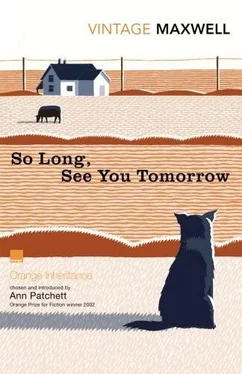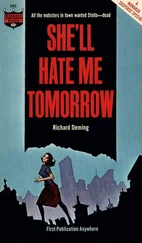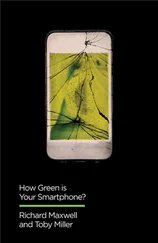When I was a child I told my mother everything. After she died I learned that it was better to keep some things to myself. My father represented authority, which meant — to me — that he could not also represent understanding. And because there was an element of cruelty in my older brother's teasing (as, of course, there is in all teasing) I didn't trust him, though I perfectly well could have, about larger matters. Anyway, I didn't tell Cletus about my shipwreck, as we sat looking down on the whole neighborhood, and he didn't tell me about his. When the look of the sky informed us that it was getting along toward suppertime, we climbed down and said "So long" and "See you tomorrow," and went our separate ways in the dusk. And one evening this casual parting turned out to be for the last time. We were separated by that pistol shot.
There was never any real doubt about who had killed Lloyd Wilson. The only person who had any reason to do it was Clarence Smith, Cletus's father. Among the things that Cletus failed to tell me was the fact that he had grown up in the country. He had only been living in town a few months. His mother had sued his father for a divorce, the grounds being extreme and repeated cruelty. His father then filed a cross bill charging her with infidelity and naming Lloyd Wilson, who lived on the adjoining farm, as corespondent.
The Lincoln Courier-Herald was, and is, a self-respecting small-town newspaper and it did not feel called upon to provide the salacious details, which are safely buried in the court records. I think it highly unlikely that Cletus was present at the divorce trial. How much did he know? Enough, probably. Enough so that it was preferable to play with a boy he hardly knew than with somebody he might be tempted to confide in — if there was any such person.
When the divorce proceedings went against him, Cletus's father sold his lease and gave up farming and moved in with Cletus's grandparents in town. He was depressed and given to fits of weeping. And he could not keep from talking about his troubles. Men who had known him for many years took to crossing over to the other side of the street when they saw him coming.
Lloyd Wilson confessed to his two brothers that he lived in fear of an attack on his life, and they told him he ought to leave town immediately. Like a figure in a dream, he took all the steps he should have taken, but in slow motion. He went to see the woman whose land he farmed and asked to be released from his contract, which did not expire until March. He consulted a lawyer.
On the morning that he was killed he left the barn door open wide so as to catch the morning light when it came. The light from his lantern must have fallen just short of the toe of the murderer's boot.
I assume that I knew all this once, since it was published in the evening paper and I was old enough to read. In the course of time the details of the murder passed from my mind, and what I thought happened was so different from what actually did happen that it might almost have been something I made up out of whole cloth. And I might have gone right on thinking that Cletus's father had come home unexpectedly and found Cletus's mother in bed with a man and killed them both, but one day, as if I had suddenly broken through a brick wall, I realized that there are always sources of information about the past other than one's own recollection, and that I didn't need to remain in total ignorance about something that interested me so deeply. I wrote to my stepcousin Tom Perry and asked him if he could dig up for me those issues of the Courier-Herald that had anything in them about the murder of Lloyd Wilson. He reported back to me that the Courier's file (the Herald was dropped a long time ago) did not go back to the year 1922 and that the public library had destroyed its file six months before and what I'd better do was apply to the Illinois State Historical Society in Springfield. It was as if I was inquiring into the funeral of Abraham Lincoln. But anyway, I did as he said, and the Historical Society sent me, from its microfilm library, photostatic copies, not always entirely legible, of eight issues of a newspaper once as familiar to me as the back of my hand. It was, of course, much more than I had asked for, a small segment of the past, remote and yet in perfect focus, like something seen through the wrong end of a pair of binoculars: ads for movies starring Norma Talmadge and Wallace Reid, good quality of men's suits at Griesheim's clothing store at $7, and many other things equally hard to believe.
I don't know where the office and printing plant of the Lincoln Courier is now; only that it isn't where it used to be, on North Kickapoo Street, half a block from the courthouse square.
Several of the pieces about the murder were written by the editor, whom I remember as a high-strung, dark-haired man with a green eyeshade and a cigarette in the corner of his mouth. His stories give the impression of being dashed off in the last minutes before the paper went to press; that is to say, they are repetitious and disordered and full of not very acute speculation. Also of cliches and reticences which the ideas of the period no doubt required. People are quoted as saying things 1 have trouble believing that they actually said, at least in those words. I am reasonably sure, for example, that Cletus's father did not say to a man he met on the street the day before the murder, "I am broken and a failure and I have nothing for which to live." Nobody I know in the Middle West has ever gone out of his way to avoid ending a sentence with a preposition. But it isn't fair, in any case, to blame that overworked small-town newspaper editor for not writing as well as Roughead. Especially since I am indebted to him for any knowledge I have of what happened.
The sheriff was on the point of taking some prisoners to the courthouse for trial when the undertaker called him. The deputy sheriff and the coroner went out to the Wilson farm and Fred Wilson showed them the stall Lloyd Wilson was in, the pail that had only a little milk in it, the milking stool, the gloves that he always wore when he was milking and that were still on his hands when they found him. Near the door of the cow barn the two men from town saw some footprints, which they covered with boards so they would stay fresh. All morning, search parties beat over the muddy fields and along the banks of a creek that ran through both farms. The bloodhounds arrived from Springfield, by train, and were taken to the scene of the crime. Two hundred people were there waiting for them. The footprints were uncovered and the dogs were led to the cow barn and unleashed. Sniffing, they circled an implement shed and a haystack and returned to the barn and then they jumped a barbed-wire fence and took off, with a pack of excited men running after them. Just before the dogs got to the farmhouse Clarence Smith had recently moved out of, they turned aside, at a gate, and followed the lane out to the public road. After pausing at the mailbox they crossed over to the other side of the road and lost the scent. Twice they were led back to the cow barn and let loose. The first time, they went into the yard of the Smith farm and up onto the porch. The second time, they turned aside again, into a cornfield, and followed a trail of footprints until they ended up on the hard road, a quarter of a mile west of the lane.
Clarence Smith had sold his lease to a younger man named James Walker. After the bloodhounds were taken back to town, Walker came out of the farmhouse and walked out to the public road. A handful of men lingered by the entrance to the lane and, moved by a floating curiosity, they gathered around him while he pulled down the flap of the mailbox. What were they expecting? At most a letter or two that they would not be allowed to read and yesterday's Courier-Herald. In the mailbox was an object so startling that they all stepped back and waited. James Walker took the gold watch out of the mailbox and opened the case and found the initials "C.S." It could only be Clarence Smith's watch, but when was it left there and for what reason? James Walker drove in to town and turned it over to the sheriff, who considered the possibility that it was a plant, put there by someone other than Clarence Smith to make it appear that he was the murderer.
Читать дальше












